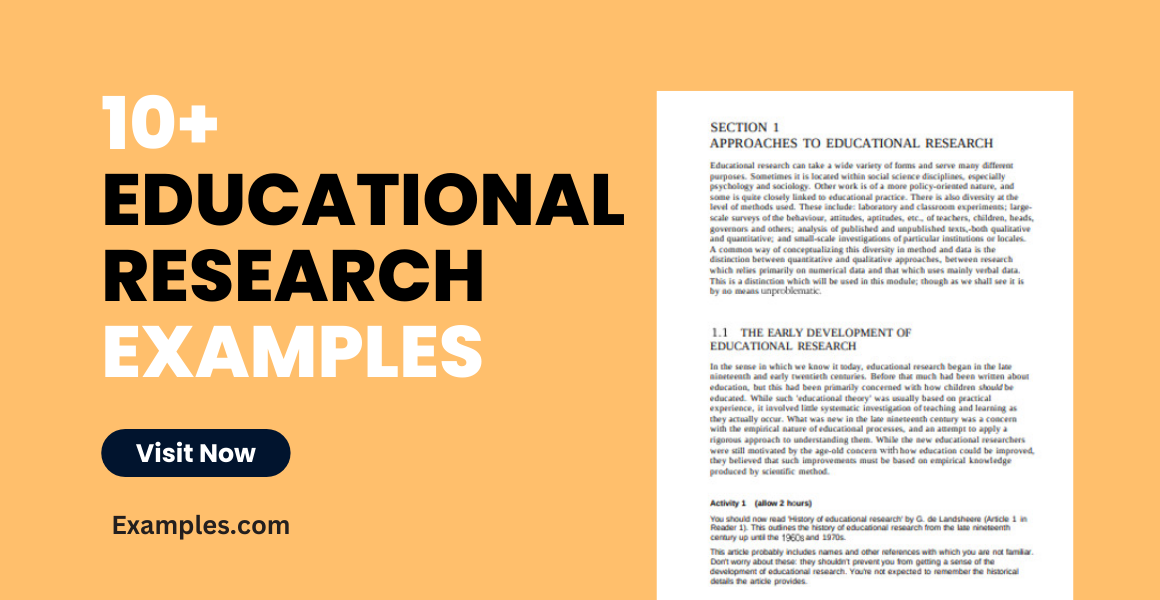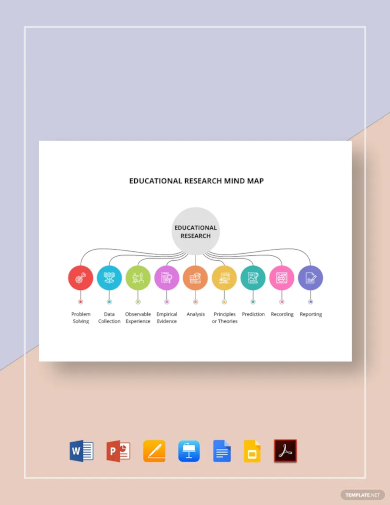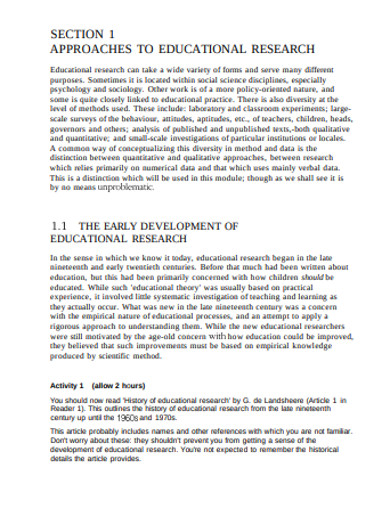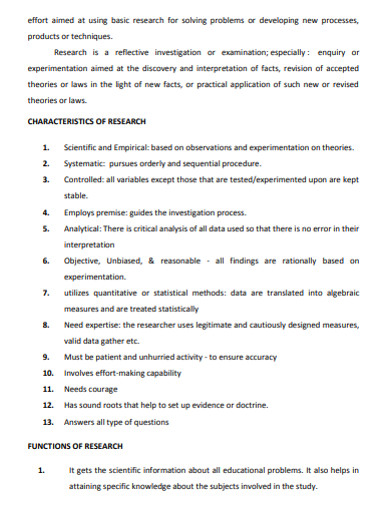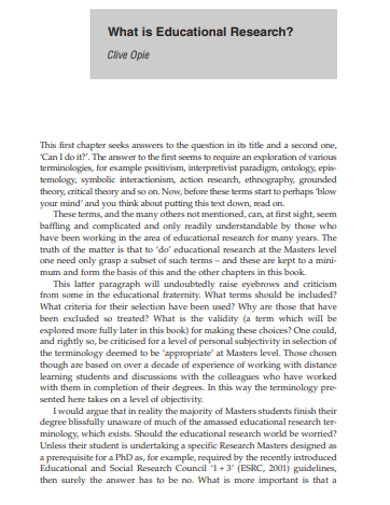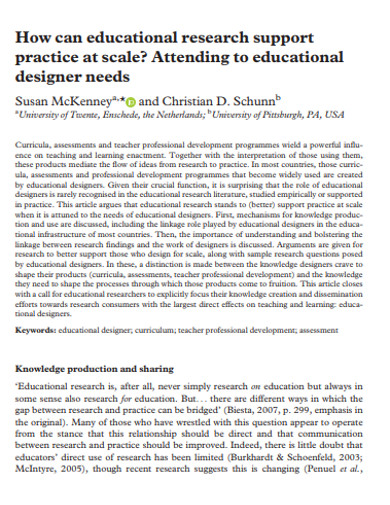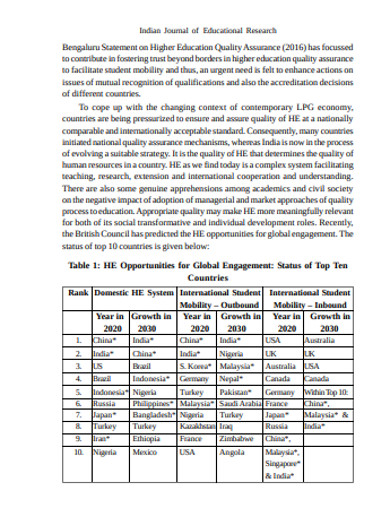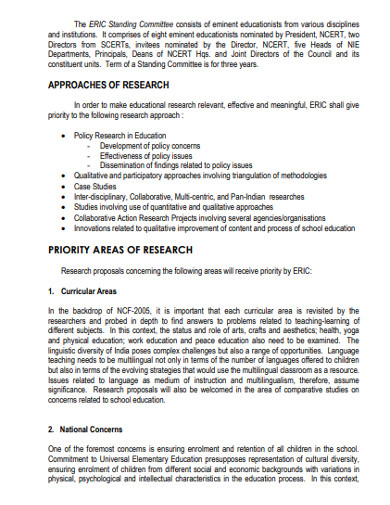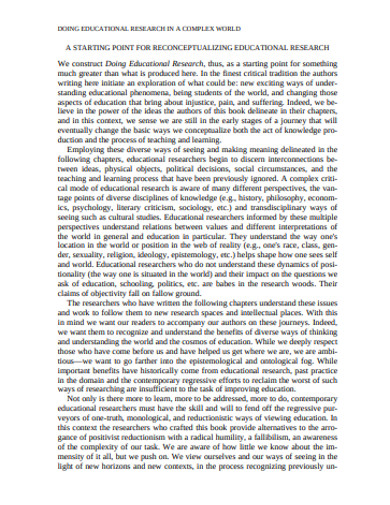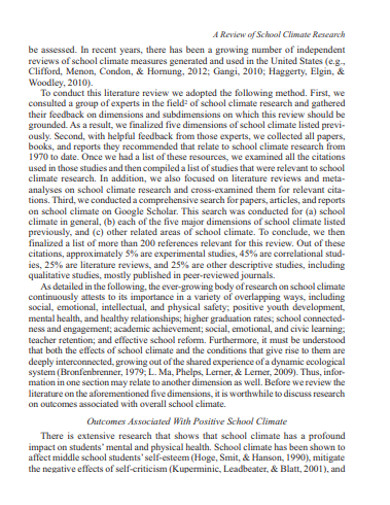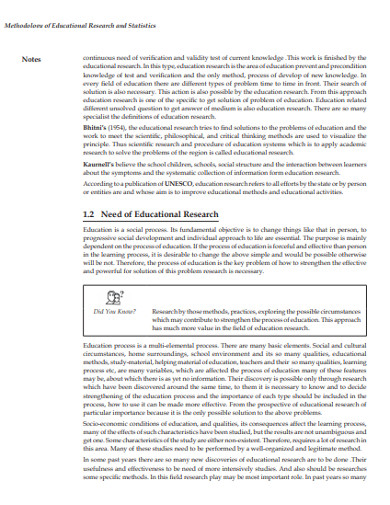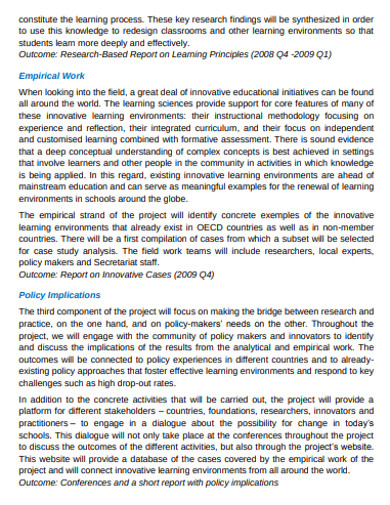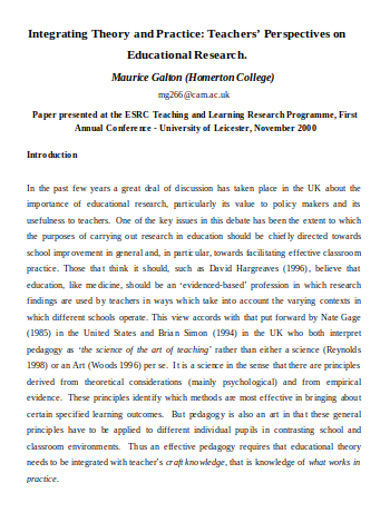10+ Educational Research Examples to Download
One of the education research highlights in 2018 is the research about the valuable benefits of small changes that you can do in a classroom as a teacher. According to the study, welcoming the students at the classroom doors can be academically and psychologically beneficial to them. Specifically, doing this simple acknowledgment improved the engagement of the students by 20 percent. It also gave the teachers more time to actually teach the students because it lessened their rebellious behavior by 9 percent. Another small change that you can do to better your classroom atmosphere is to redesign it. Combining a compilation of students’ outputs, learning aids, and inspirational pictures can make the room warmer and more stimulating. There was actually a study conducted to prove that putting a lot of decorations in a classroom can distract the students and impair their thoughts.
What is Educational Research?
The things that we mentioned above were just a few of the successful educational studies that the educational researchers conducted to better the educational structure. Educational research is scientific research which allows the educational professionals to collect and analyze data and evidence to better the learning process. It also allows us to understand the human characteristics and organizations that influence the educational ends. In terms of the attributes of scholarly research, the researchers widely acknowledged that it should be precise and methodical.
Educational Research Approach
There are two types of approaches for conducting this type of research. Each of these methods has its distinct purposes.
1. Basic Approach or Academic Research
Students and post-graduates who are the ones who usually carry out this type of research as part of the requirements to graduate and doctoral job. The purpose of their studies is to search for answers, uncover the truth, and create an educational hypothesis. Aside from speculation development, these studies also intends to examine, polish, revise these theories.
2. Applied Approach or Contractual Research
Though it has a different purpose, applied research can also correlate to academic research. This study intends to solve existing educational problems. To do it, you have to obtain the educational theories and its principles which the basic approach can derive. You will, then, determine its relevance by testing hypotheses within a given setting.
10+ Educational Research Examples
Now that you know the meaning of education research and its different approaches take a look at the following sample documents. You can use these downloadable files for you to use as a guide on creating an educational research paper.
Educational Research Mind Map Template
1. Educational Early Development Research Example
2. Methodology of Educational Research Example
3. Sample Educational Research Example
4. Educational Designer Research Example
5. Journal of Educational Research Example
6. Educational Research and Innovation Commitee Example
7. Simple Education Research Example
8. School Climate Research Example
9. Methodology of Educational Research and Statistics Example
10. Educational Research policy Example
11. Teachers’ Perspectives on Educational Research Example
How to Conduct a Systematic Research for Your Educational Research
It is essential to strategically write your research paper for your educational study to consider it as successful. To do it, below are the basic steps that you can follow.
1. Choose a Topic
The first step of everything can be the hardest part. However, choosing a topic is the most crucial part of the research. Therefore, you have to do it correctly. Don’t worry because we have prepared a few helpful tips that you can use below:
I. Write within the boundary that your instructor assigns. Most likely, your instructors will give you clear instructions or guidelines for the things that you can write. Don’t waste your time and stay within the line.
II. Choose a topic that you are interested in. In this way, your research journey can be more enjoyable than you think it would be since you like what you are writing.
III. Stand out from the crowd by selecting a unique topic. To do that, avoid subjects that are controversial and trendy.
IV. If you are having trouble looking for the right topic, consider asking your instructor for advice.
2. Do Preliminary Research.
Make sure that the topic you select has enough information available. You can also use this as a tip in choosing a research topic. You can determine it by doing preliminary research or look for existing resources. If you think that the information is too broad, make your research question more specific. You may also consider checking for lecture notes, textbooks, educational research journals, and encyclopedias, and other resources.
3. Start your Actual Research.
Now that you have a clear direction for your research start looking for the information that you need. There are a lot of places that you can visit to get this information. You can go to a public library, read newspapers and magazines. However, to make it easier for you, you can find most of the necessary information through the internet. Non-governmental and governmental organizations have published several types of research and other essential information that you can use for your project.
4. Evaluate Your Sources
There is no doubt that you can find information on the internet. However, there is a drawback to this data. The credibility and reliability of this information can be questionable. That is why it is crucial to check the credibility, accuracy, reasonableness, support(CARS) of the information that you gather from the internet.
5. Take Note of the Sources
Take note of the author, title, publisher, URL, etc. of the information that you have gathered during the consultation. You will need these data for the bibliography of your research paper.
6. Begin Writing
Start by initially organizing the information that you have gathered and by creating a research paper outline. You will, then, create a rough draft of your study based on the framework that you created. Now that your ideas are on paper, you will be able to reorganize it accordingly. Revising your work multiple times can help to improve your research paper. After that, cite the sources that you have noted. Citing your sources will allow you to give proper credits to the authors of the contents that you utilized to avoid plagiarism. It will also enable your readers to locate your sources if they decide to replicate your study.
7. Proofread
This step will ensure that your work is grammar, spelling, and punctuation error-free. You also need to check if you are citing your sources correctly, and your readers will be able to understand your message.
Education is one of the fundamental things that humans should avail. It allows everyone to acquire general knowledge and develop humans’ ability to reason and judge to prepare them intellectually for mature life. However, this fundamental thing has its loopholes and issues. Through educational research, humans address and solve these problems.


